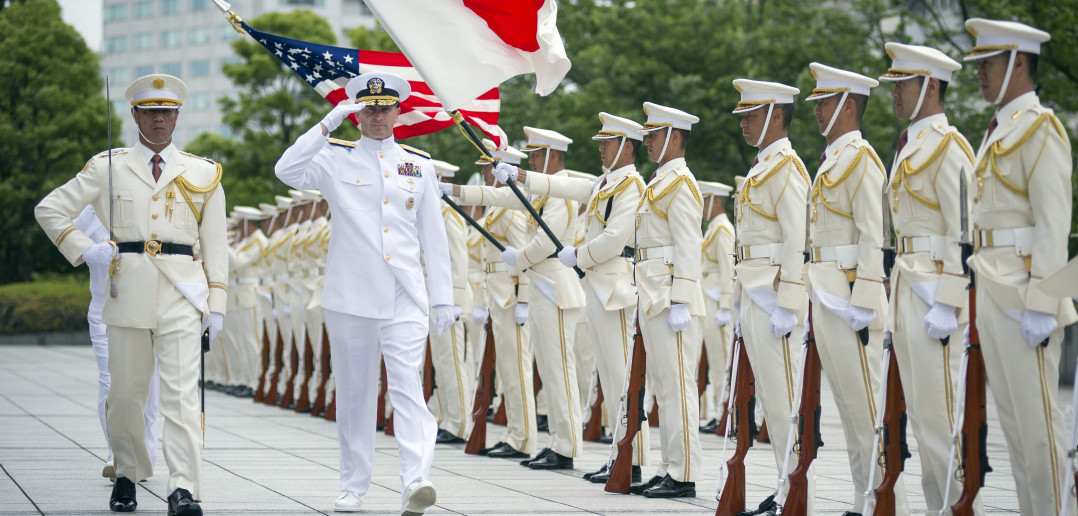
Andre Gray
The Japanese restrictions on collective defense and power projection outlined in the famed Article 9 have produced in Japan’s culture a deep pacifist sentiment, which plays an essential part in the country’s postwar identity. The new legislation will not change or challenge that pacifist core, but instead clear out what, in my view, are anachronisms that prevent Japan from being a fully normalized state that can participate like any other in security alliances, maritime defense networks and UN-sanctioned peacekeeping missions. And let’s not forget that Japan has already outgrown the limits of its US-imposed constitution—Japan has in the past sent missions of support to both Iraq and Afghanistan. President Abe understands that Japan can’t afford to pose as some exceptional post-conflict state when faced with a security sphere that includes an unpredictable North Korea and an aggressive, military-investing China.
To those who say this move will strain relations with China, keep in mind that Japan’s current price deflation troubles make any attempt at an East Asian arms race or serious ramp-up of defense capabilities unfeasible. For Abe it seems to be more about flexibility and legitimacy, and less about actual expansion. That being said, I think the opposition makes a good point that the government hasn’t done a good job of defining the parameters of the new rules. If Abe doesn’t want to alienate his people, he needs to be very clear about what Japan will consider as grounds for supporting allies, otherwise future governments will be able to interpret “existential threat” as they please.
Kara Junttila
Japan’s new defense legislation is really just a next step along an evolutionary process for the country rather than a dramatic practical change. Among other aspects of security policy, Japan’s military spending and Arms Export Ban have been changed over the past few years, in line with an overall trend towards normalizing Japan’s military and loosening the most restrictive pacifism-based requirements. Additionally, SDF forces have already operated overseas, for example aiding post-war reconstruction in Iraq and anti-piracy efforts in the Gulf of Aden. This new legislation in some ways just formalizes changes that Japan’s military posture has already undergone. It is a smart idea for Japan, and useful for Japan’s allies, to reevaluate and codify its policies for use of the SDF.
However, the response of Japan’s population and constitutional law experts with large-scale protests and planned legal challenges has been quite dramatic—which should be a concern for both Prime Minister Abe and Japan’s allies. Opponents of the new legislation in Japan are from across the political spectrum and have varied concerns including that the law is unconstitutional, will draw Japan into US wars abroad and will renew Japanese militarism. The Japanese government has outraged many of its citizens in passing this law, and the United States in particular should be concerned if Japanese public opinion is not behind increased military cooperation as visualized by Abe. The domestic divisiveness of this law will need to be resolved before Japan can move forward as a “proactive pacifist” (as Abe puts it) in any meaningful way.
Dan Morgan-Russell
There is finally a security dilemma in the South China Sea. Without that massive Chinese military buildup around Japan and the Senkaku Islands, Japan would not have needed to pass a law allowing for military deployment overseas.
This tension could escalate further, with China increasing its deployment and the US and Japan responding with similar military increases, ensnaring all three powers in a serious security dilemma. Each side will become more worried of the buildup of the other, respond with their own buildup and repeat the cycle.
However, even if Japan, China and the US continue deploying hard power into the South China Sea, this will not turn into a serious, direct conflict. Both the US and China have serious nuclear arsenals, and the Japanese civilian nuclear infrastructure is so robust that Japan has rapid breakout capability. These nations will not go to war with each other.
In the unlikely event that there is some sort of direct conflict, it will be limited in scope. Japan and China might fight over the Senkakus, but the conflict would start and end there.
Kenneth Lee
When looked at closely, the new Japanese law is hardly a major threat; it simply allows Japan to send troops abroad to fight with or on behalf of a distressed ally. With support from the United States, Japan’s major ally, it seems that this collective self-defense law would be uncontroversial. But domestically, the law passed through political (and physical) conflict. Now, the well-renowned Japanese constitutional legal scholar, Setsu Kobayashi, is planning to muster 1000 lawyers to challenge the legislation in the Tokyo district courts. Internationally, China and even South Korea (Japan’s ally by way of the US) have expressed vehement opposition. The law does not make Japan a military belligerent, but it is a key symbol representing a more conservative Japanese government that is pushing to increase the country’s power.
When combined with Japan’s historical revisionism, increased military investments and Abe’s regular visits to Yakesuni shrine, this law seems to herald Japan’s relentless march toward military normalization. While Japan, the world’s third largest economy, has every right to be more involved on the global stage, they need to be wary of how their neighbors interpret their actions.
Japan has no current motive for war, but due to the sensitive history, South Koreans and Chinese have reason to worry about their ascendant neighbor. In the long run, this law will inevitably increase tensions with China (who already feels contained by the actions of the US and its allies) and potentially weaken the South Korean-Japanese friendship, which is a crucial relationship in America’s alliance system. In the world of international politics, the interpretation of an action by other parties is a crucial factor in whether there is stability or tension. It is likely that Japan’s actions will inevitably lead to the latter.
The views expressed by the author do not necessarily reflect those of the Glimpse from the Globe staff, editors, or governors.







